Home Tags Posts tagged with "North Korea"
North Korea
London Olympic organizers have apologized to the North Korean women’s football team after their images were shown on a screen beside a South Korean flag.
Kick-off at Glasgow’s Hampden Park on the first day of the Games’ sporting action was delayed for about an hour.
The men’s football competition gets under way with eight games later, including Britain v Senegal at Old Trafford at 20:00 BST.
The penultimate day of the torch relay sees the flame visit Buckingham Palace.
The flag mix-up at Hampden Park had been an “embarrassing mistake” and not the start Games organizers would have wanted, but “no great harm was done”.
As the North Korean players were being introduced before the match against Colombia, South Korean flags were mistakenly displayed in the video package.

London Olympic organizers have apologized to the North Korean women's football team after their images were shown on a screen beside a South Korean flag
The squad walked off and could only be persuaded to return when the teams were announced again with each player’s face displayed next to the North Korean flag.
Relations between the two Koreas are tense – they remain technically at war following the 1950-53 Korean conflict, which ended in an armistice.
Speaking after the match, North Korea’s coach Sin Ui Gun said: “Our team was not going to participate unless the problem was solved properly…
“Unfortunately it took some time later for the broadcast to be done again properly and we made the decision to go on with the match.”
It was not immediately clear who had produced the video shown in the stadium.
A statement released by London 2012 organizers said: “We will apologize to the team and the National Olympic Committee and steps will be taken to ensure this does not happen again.”
London 2012 spokesman Andy Mitchell said: “The South Korean flag was shown in the video package on the screen before the kick-off and the North Koreans were naturally very upset about that…
“A genuine mistake was made for which we apologize.”
The opening match in the men’s football gets under way at 12:00 BST at Hampden Park when Honduras take on Morocco, followed by Spain v Japan.
Matches are also taking place at St James’ Park in Newcastle, Cardiff’s Millennium Stadium and the City of Coventry Stadium.
In other Olympics news:
• In the first event of the Games, Britain’s women footballers beat New Zealand 1-0 at the Millennium Stadium in Cardiff. This was one of six women’s football matches played on Wednesday
• Prince Charles and the Duchess of Cornwall visited the torch relay in Tottenham, north London, on Wednesday. On the torch relay’s penultimate outing – day 69, which can be followed live here – the flame will pass through Downing Street and be greeted at Buckingham Palace by Princes William and Harry, and the Duchess of Cambridge
• A global investment conference being held in London on Thursday will kick off a series of business summits intended to showcase the UK and attract investment during
[youtube ZuVdSLYy_LU]
North Korean leader Kim Jong-Un is married, state media have confirmed for the first time.
Reports referred to Kim Jong-Un attending the opening of an amusement park with his wife, “Comrade Ri Sol-Ju”.
There had been much speculation Kim Jong-Un’s private life in recent weeks when an unidentified woman was pictured attending events with him.
Kim Jong-Un took over as leader of the country after the death of his father Kim Jong-Il in December last year.
The eight minute report on North Korean radio which mentioned Ri Sol-Ju was broadcast at 20:00 local time on Wednesday.

North Korean media reports referred to Kim Jong-Un attending the opening of an amusement park with his wife, "Comrade Ri Sol-Ju”
Analysts have been watching Kim Jong-Un and his inner circle for clues as to the direction in which they will take the isolated state.
Last week authorities performed a military reshuffle widely interpreted by analysts as an attempt to stamp the authority of the new leader on North Korea’s powerful army.
There is a North Korean singer by the name of Ri Sol-Ju but it has not been confirmed whether Kim Jong-Un’s wife is the same woman.
Ri Sol-Ju is thought to be the same “mystery woman” who accompanied Kim Jong-Un to several events in recent weeks and whose Western dress and hairstyle led some to speculate on the influence of Kim Jong-Ju’s brief European education.
South Korean media had previously speculated that the woman was another North Korean singer, Hyon Song-Wol.
The focus on Kim Jong-Un’s personal life has been intense – within minutes of the news breaking, Ri Sol-Ju’s name was trending on micro-blogging site Twitter.
Young North Korean leader Kim Jong-Un has been given the title of ”marshal”, state media has announced.
The move followed a high-level military reshuffle in which army chief Ri Yong-Ho was removed ”due to illness” and a little-known general promoted.
Marshal is the highest military rank and would cement Kim Jong-Un’s control over the army, reports say.
Kim Jong-Un inherited the leadership of North Korea from his father, Kim Jong-Il, who died in December 2011.
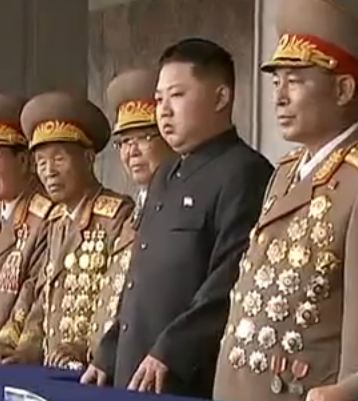
Marshal is the highest military rank and would cement Kim Jong-Un's control over the army
The title of marshal was previously held by the late Kim Jong-Il, who received a posthumous promotion to the rank of generalissimo in February, when the country marked his 70th birthday.
”A decision was made to award the title of Marshal of the DPRK [North Korea] to Kim Jong-Un, supreme commander of the Korean People’s Army,” the KCNA statement said.
The decision was jointly made by the Central Committee and the Central Military Commission of the Workers’ Party of Korea, the National Defence Commission of the DPRK [North Korea] and the Presidium of the Supreme People’s Assembly of the DPRK [North Korea], the statement said.
This latest promotion is another sign that Kim Jong-Un is planning to rule North Korea through the army, just as his father did – and that he is tightening his grip on the levers of power.
Ri Yong-Ho, 69, who was a vice-marshal, was also vice-chairman of the powerful Central Military Commission and held top posts in the ruling Workers’ Party.
His removal took many North Korea observers by surprise, with widespread skepticism at the official explanation for the move.
He was seen as a key figure in the recent transition of power to the young leader.
A day after Ri Yong-Ho’s removal, Pyongyang appointed a new vice-marshal, Hyon Yong-Chol, of whom little is known except that he was made a general in 2010.
”What we are seeing is a reconstitution of the North Korea leadership from the old guard who were loyal to Kim’s father to a new guard,” said Jasper Kim of the Asia Pacific Global Research Group.
Hyon Yong-Chol has been appointed as North Korea’s new vice-marshal, the official KCNA news agency says.
The move comes a day after the army chief, Ri Yong-Ho, was removed from his post “due to illness”.
The decision was made by the Central Military Commission of the Workers’ Party of Korea and the National Defense Commission of North Korea, KCNA said.
The statement did not say if Hyon Yong-Chol was taking over the top military job from Ri Yong-Ho.

Hyon Yong-Chol has been appointed as North Korea’s new vice-marshal
Little is known of Hyon Yong-Chol, who is reported to be a member of the party’s 120-member central committee. He is now one of four vice-marshals in the army.
Ri Yong-Ho, 69, who was also a vice-marshal, was vice-chairman of the powerful Central Military Commission and held top posts in the ruling Workers’ Party.
Hyon Yong-Chol is believed to have been appointed a general in 2010 but is not currently part of the military commission chaired by young leader Kim Jong-Un, reports said.
He appears to be the latest rising star in North Korean politics.
Ri Yong-Ho’s removal took many North Korea observers by surprise, with widespread skepticism at the official explanation for the move.
He was seen as a key figure in the recent transition of power from Kim Jong-Il, who died in December 2011, to his son.
He was made army chief three years ago under Kim Jong-Il and appeared regularly at state occasions beside the late Kim.
He was also one of seven top officials to accompany the younger Kim as he followed the hearse containing his father’s body at his state funeral.
A spokesman for South Korea’s Unification Ministry told reporters that Ri Yong-Ho’s departure was “very unusual”.
Some analysts say ”illness” is not an uncommon pretext in Pyongyang when a member of the elite leadership is removed.
Now in power for six months, Kim Jong-Un is rumored to be promoting a new generation of officials, and is being carefully watched for signs that he will take the country in a new direction.
North Korean state media has announced that military chief Ri Yong-Ho has been removed from all official posts.
As well as being head of the army, Ri Yong-Ho was vice-chairman of the powerful Central Military Commission and held top posts in the ruling Workers’ Party.
In a short statement, the party said Ri Yong-Ho had been removed from his posts “because of illness”.
However, there is widespread skepticism about that explanation.
The decision to relieve Ri Yong-Ho of his duties came at a meeting of the Workers’ Party Central Committee politburo on Sunday, state-run news agency KCNA said.
The brief report made no mention of a successor.
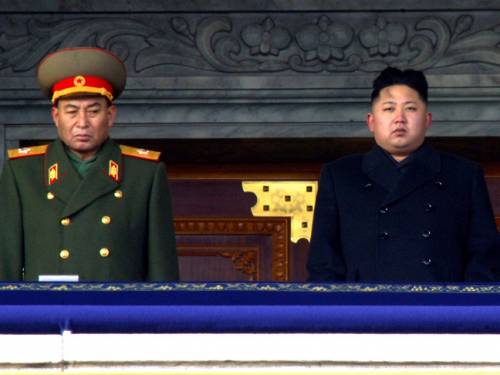
North Korean military chief Ri Yong-Ho has been removed from all official posts
In Seoul, a spokesman for the Unification Ministry told reporters that the move was “very unusual”.
“It’s quite a rare case that the North promptly and publicly announced early this morning the outcome of a meeting yesterday, on 15 July. We will keep monitoring closely,” Kim Hyung-suk said.
Ri Yong-Ho was made army chief three years ago under Kim Jong-Il, the current leader’s father who died in December 2011 after ruling North Korea for almost two decades.
The army chief regularly appeared at state occasions beside Kim Jong-Il.
He was also one of seven top officials to accompany the younger Kim as he followed the hearse containing his father’s body at his state funeral.
Ri Yong-Ho was widely thought to be a figure in the inner circle of the new leader and instrumental in helping him cement his position.
His removal is now being scrutinized by analysts for signs of the direction in which Kim Jong-Un, seen as young and inexperienced, will take the country.
The army and Workers’ Party are the two primary institutions that bolstered the Kim family dynasty, said Robert Kelly, a professor at the Pusan National University in South Korea.
Kim Jong-Un did not serve in either of those two institutions which are ”traditional proving grounds and grooming grounds… for the leadership in the system”.
”So his position is very vulnerable because he does not know the generals and colonels who prop up the state,” said Dr. Robert Kelly.
In April North Korea defied international warnings to launch a rocket – an action its neighbors called a long-range missile test that contravened UN resolutions.
South Korea also warned earlier this year that Pyongyang appeared to be in the late stages of preparing for a third nuclear test – a claim North Korea has denied.
International talks aimed at ending North Korea’s nuclear ambitions have been stalled since 2009.
Agency news in Seoul reported that a mystery woman was sitting next to the young North Korean leader Kim Jong-Un at a concert this week.
The question of who she was, and what she was doing sitting next to Kim Jong-Un, buzzed through South Korea’s news media.
North Korean media gave no details, but showed her accompanying Kim Jong-Un to various state occasions: bowing with him in front of his grandfather’s portrait to mark the 18th anniversary of Kim Il-Sung’s death, walking with him in a fitted black skirt suit and heels, and sitting next to him during the concert performances.
The Hankyoreh newspaper in South Korea said one picture taken during the performances showed the mystery woman with her hand on the armrest of Kim Jong-Un’s chair.
The normal posture for those in Kim Jong-Un’s entourage is to keep their elbows tucked respectfully in.
This, said the paper, indicated that she was either his wife, or his younger sister.

One picture taken during the performances showed the mystery woman with her hand on the armrest of Kim Jong-Un's chair
A similar discussion erupted six months ago, when an unnamed woman appeared beside Kim Jong-Un during his father’s funeral commemorations.
It is not known whether Kim Jong-Un – believed to be in his late 20’ – has married.
But North Korea’s two previous rulers did not routinely include their partners in public events, leading many to conclude that the new mystery woman is a family member.
Not South Korea’s Joongang Ilbo newspaper, though. Its headline this week asked: “Is Hyon the new first lady of NK?”
The paper identified Kim Jong-Un’s companion as Hyon Song-Wol, a former singer with North Korea’s Bochonbo Electronic Music Band, whose popularity, it says, peaked in 1995 with her hit song Excellent Horse-Like Lady.
She reappeared to perform for the new North Korean leader in March this year, says the paper, after six years away from the limelight, during which time she reportedly married and had a child.
An unnamed South Korean intelligence official was quoted as saying that “the two have known each other since they were in their teens, and… rumors about the two having an affair have been circulating among Pyongyang’s top elite”.
If true, Seoul’s rumor mill goes, what does that say about the workings of North Korea’s new leadership – and more particularly, about the mind of its young leader?
Has Kim Jong-Un chosen this smart young woman in western dress as his partner? Is he bucking hoary old tradition by appearing with her – perhaps still married – in public?
As usual, windows into North Korea throw up more questions than answers.
For now, ”mystery woman” she may remain.
But then, let us not forget, after six months in power, the man next to her – the heir to North Korea’s closed “Communist Monarchy” – is only slightly less of a mystery than she.
North Korean leader Kim Jong-Un has been seen attending different events with a mystery woman.
The fact was led to speculation in South Korean media about her identity.
The woman was shown on state TV on Sunday with the new leader at an official ceremony in honor of his late grandfather, Kim Il-Sung.
And on Saturday, the same woman was seen sitting next to Kim Jong-Un at a concert.
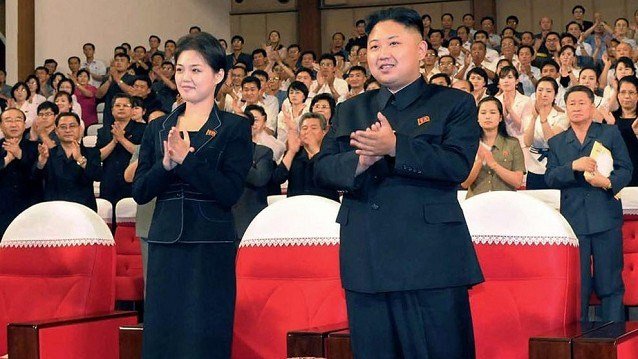
Kim Jong-Un has been seen attending different events with a mystery woman
The appearances have made front-page news in South Korea.
Kim Jong-Un took power in the Communist state after the death of his father at the end of last year.
North Korean society is so closed to the outside world that no-one knows if Kim Jong-Un is married, or even his exact age.
So the appearance by his side of an elegant, black-clad, short-haired woman, probably in her 20s, has left many North and South Koreans playing guessing games.
Some South Korean news outlets suggested she might be his younger sister, Kim Yo-Jong, of whom very little is known, or even his wife.
On Sunday, the woman, dressed in a black jacket and skirt, was seen bowing with Kim Jong-Un, as part of a ceremony to mark the 18th anniversary of the death of Kim Il-Sung, the country’s founder.
She is believed to be the same woman shown by North Korea’s KRT broadcaster on Saturday walking into a concert behind Kim Jong-Un and sitting next to him.
A photo of the pair was also published in the North’s Rodong Sinmun newspaper on Monday, according to the Associated Press.
A new study has found that North Koreans have more access than ever to outside media, including radio, TV and DVDs.
North Korean government was unable to maintain a ”total monopoly” over information and the people’s ”understanding of the world is changing”, said the report.
Viewing of foreign DVDs in North Korea, especially, had risen sharply.
Most of these DVDs were South Korean dramas, and had been smuggled across the border with China, said the report, commissioned by the US government.
“When you get very well-produced, compelling South Korean dramas – a picture into a place that you’ve been fascinated with your whole life, because so much North Korean propaganda revolves around South Korea – that’s extremely powerful,” said Nat Kretchun, one of the authors of the study.
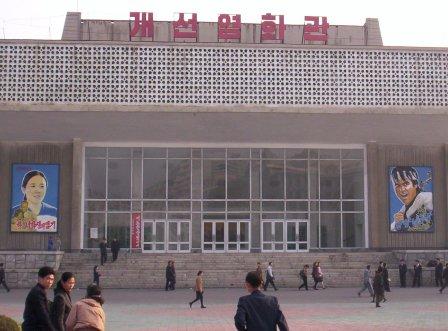
A new study has found that North Koreans have more access than ever to outside media, including radio, TV and DVDs
The study was conducted by global consulting group InterMedia over the last two years.
The findings were based on a survey of 250 North Koreans – mostly refugees and a handful of travellers, as well as expert interviews.
Almost half the respondents said they had watched a foreign DVD.
North Korea has traditionally been ranked as the country with the lowest media freedom in the world.
While the majority of North Koreans still did not have direct access to foreign media, the number of those who did ”appears to be steadily increasing”, the report said.
North Koreans are also ”less fearful of sharing that information than before”, it said.
Near the border with China and South Korea television viewing is also popular, with a third who said they watched TV claiming to have viewed foreign broadcasts.
Foreign radio broadcasts, the report added, ”remain important as a source of real-time, sensitive outside news”.
The ”elites” – those with greater financial means or influence – have more access to external sources of media.
Recently, the report found, devices such as computers, USB drives and illegal Chinese mobile phones ”have begun entering North Korea in substantial numbers, especially among the elite”.
However, a personal network – well-connected friends and ”word-of-mouth” – remain the most trusted source of unsanctioned information among those the study interviewed.
The increased access to external sources of information could lead North Koreans to view their own government with a more critical eye, the report concluded.
”While significant bottom-up pressure on the regime is unlikely in the short term, many people in North Korea are beginning to look more critically at the basic premises of their country’s power structure and policies,” it said.
Oh Kil-nam, a retired South Korean economist, says his life was ruined by his decision to defect to North Korea.
Oh Kil-nam, 70, still does not know the fate of his wife and daughters – either dead or imprisoned in a labor camp.
In 1985, North Korean agents approached Oh Kil-nam and suggested he defect.
The agents offered him an important job working as an economist for the North Korean government and promised to provide free treatment for his wife’s hepatitis.
Oh Kil-nam took the offer seriously. He had just completed his PhD in Germany on a Marxist economist. Back at home in South Korea, Oh Kil-nam had been active in left-wing groups opposed to the country’s authoritarian regime.
His wife Shin Suk-ja was horrified by the idea of going to the North and opposed it from the start.
“Do you know what kind of place it is?” she asked.
“You have not even been there once. How can you make such a reckless decision?”
But Oh Kil-nam replied that the Northerners were Koreans too – they “cannot be that brutal”, he told her.
So at the end of November 1985, Oh Kil-nam, his wife and two young daughters travelled via East Berlin and Moscow to Pyongyang.
When they arrived at Pyongyang airport, Oh Kil-nam began to see he had made a mistake in coming. Communist party officials and children clutching flowers were there to meet them. But despite the cold of a North Korean December, the children were not wearing socks and their traditional clothes were so thin that they shivered.
“When I saw this I was really surprised and my wife even started to cry,” he said.
Communist party officials drove Oh Kil-nam and his family to what they described as a guest house. The building was inside a camp in the mountains and guarded by soldiers. There was no treatment for Shin Suk-ja’s hepatitis and no job for Oh Kil-nam as an economist. Instead, for several months, North Koreans indoctrinated them in the teachings of The Great Leader Kim Il-sung, the founder of the current regime.
Oh Kil-nam and his wife began working for a North Korean radio station.
“My wife began as a broadcaster but she was not able to carry on for long. Her health had deteriorated and at the same time she was quite critical of the North.”
Oh Kil-nam was less independent. “I began to read scripts based on party directives – in the end, I was like a parrot.”
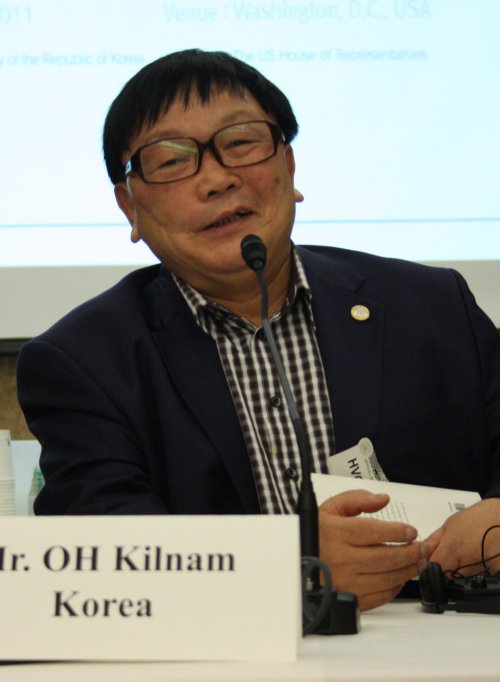
Oh Kil-nam, now 70, still does not know the fate of his wife and daughters after more than 20 years
While he was there Oh Kil-nam came across South Koreans who had been abducted, including two air stewardesses and two passengers from a Korean Air Lines flight that had been hijacked by North Koreans in 1969.
Oh Kil-nam was approached to go on a mission abroad. He was to be based in the North Korean embassy in Copenhagen, from where he could do what had been done to him – lure South Korean students in Germany to the North Korean embassy.
When Shin Suk-ja heard about the plan she was furious.
“I remember the two of us talking about it softly under the blanket. I told my wife that by fulfilling this mission, we would preserve our livelihood in North Korea. But she slapped me in the face.”
His wife said they would have to pay the price for his mistakes – he could not entrap others.
“She told me I had to find a way to escape when I got to Europe, that there would be a way to rescue the family.”
On arriving at Copenhagen airport, Oh Kil-nam managed to escape from North Korean control. “I approached the immigration desk. I had a little piece of paper on which I had written: HELP ME. I explained that the passport they were seeing was not my real passport, that my real name was Oh Kil-nam, and that my real passport had been confiscated in North Korea.”
After two months in jail in Denmark, the Danish authorities sent Oh Kil-nam to Germany. There he tried to free his family, but with no luck.
“My biggest mistake was not to approach the German Foreign Ministry directly.”
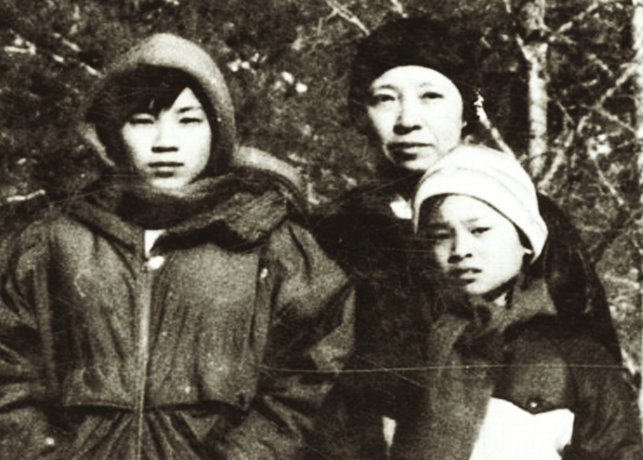
Oh Kil-nam’s wife, Shin Suk-ja, and their daughters, Hye Won and Gyu Won
For Shin Suk-ja and her two daughters, Oh Kil-nam’s defection was catastrophic. They were taken to Yodok concentration camp, where the North Korean government imprisons its enemies. The conditions in this slave labor camp are reportedly as bad as anything in Nazi Germany or Stalin’s Gulag.
For a time, Oh Kil-nam heard nothing about the fate of his family. Then in February 1991 he managed to get six photographs of his wife and daughters and a tape cassette with a message from them.
“On the tape my daughters were telling me how much they missed me and my wife was saying that perhaps it would be OK for me to come back now.”
Oh Kil-nam suspected a trap. “North Korea was trying to stop me from heading back to South Korea because I had experience of working in its propaganda division. I knew a lot of its secrets, including the fact that many people from South Korea, who were kidnapped and taken to the North, were working there.”
But nonetheless the realization that he could not get back in touch with his family was devastating.
“By that time I had completely given up. My whole body was just broken down.”
In 1992, Oh Kil-nam returned to South Korea. “I felt that my death was not far away. I just wanted to be close to my brother and my sister on my death bed.”
Oh Kil-nam did not die but nor has he ever heard from his wife and daughters again. He does not know whether they are alive or whether they died in the prison camp.
“I do feel that I may be able to meet my family again, but it is just a hope, a glimmer of hope inside a dark tunnel.
“I hope there will come a day when I can meet my family again, hug them and embrace them, and cry tears of happiness. If it does happen it will be the happiest day of my life.”
Chinese President Hu Jintao pledged strong ties with North Korea, amid serious tensions between the two Koreas in the wake of Pyongyang’s failed rocket launch.
Hu Jintao’s promise came at a meeting with a Workers’ Party delegation headed by Kim Yong-Il in Beijing on Monday.
It came as North Korea threatened “unprecedented action” against Seoul.
Meanwhile the US says it has raised allegations with China that a missile launcher seen in Pyongyang last week was of Chinese origin.
Tension on the Korean peninsula is high following the failed rocket launch on 13 April. Pyongyang said it was putting a satellite into orbit but critics said the launch was a disguised test of missile technology banned under UN resolutions.

US has raised allegations with China that a missile launcher seen in Pyongyang last week was of Chinese origin
South Korea also says there are signs that North Korea may be planning a third nuclear test.
China – which is North Korea’s closest ally and biggest trading partner – did not block UN condemnation of the launch.
But in the meeting on Monday with the Workers’ Party international relations chief, President Hu Jintao emphasized close ties between the two nations.
“We will carry on this tradition… boost strategic communication and coordination on key international issues and work for peace and stability on the Korean peninsula,” state television quoted him as saying.
China – seen as the country with the greatest degree of influence over North Korea – has repeatedly called for calm on the Korean peninsula, as tensions between the two Koreas have risen.
On Monday North Korea warned of “unprecedented” action against South Korea’s ruling establishment, in response to its criticism of the rocket launch.
A special operation to begin “soon” would “reduce its target to ashes”, the North Korean military said in an unusually strong statement. On Friday North Korea also held a rally calling for the death of South Korea’s president.
South Korea, meanwhile, said last week it had deployed new missiles capable of hitting any target in North Korea.
Meanwhile, White House spokesman Jay Carney said in a briefing on Monday that Washington had raised questions over a mobile missile launch vehicle seen in a North Korean military parade earlier this month.
Analysts believe that the 16-wheel missile transporter-erector-launcher (TEL) seen carrying what appeared to be a new missile may have been of Chinese origin.
Last week Jane’s Defence Weekly, citing an unnamed official, reported that the UN Security Council was investigating the claims.
If it had supplied the technology or vehicle, China could be violating UN resolutions passed after North Korean nuclear and missile tests in 2006 and 2009, the report suggested.
Asked about the matter, White House spokesman Jay Carney said the US would “continue to work with the international community, including China, to enforce sanctions against North Korea’s ballistic missile program and nuclear programme”.
“We’ve raised the allegations with the Chinese government … as part of our ongoing close consultations on North Korea,” he said.
China says it has abided by UN sanctions on North Korea.
Kim Jong-Un has made his first televised speech, as Pyongyang marks the 100th anniversary of the birth of North Korea’s founder, Kim Il-Sung.
In front of cheering crowds, the new leader praised and offered respect to Kim Il-Sung – his grandfather – and his father, the late Kim Jong-Il.
As part of the celebrations, a huge military parade has been staged in the main square of Pyongyang.
Kim Jong-Un’s speech comes just two days after a failed rocket launch.

Kim Jong-Un has made his first televised speech, as Pyongyang marks the 100th anniversary of the birth of North Korea's founder, Kim Il-Sung
The attempted launch was condemned by the international community, amid concern that it was a covert test of long-range missile technology.
On Sunday, television footage showed thousands of soldiers carrying red flags marching into the square to the sound of drumbeats.
It is the first time Kim Jong-Un, believed to be in his late 20s, has been seen speaking publicly since taking power following the death of his father in December.
“I express my greetings to our compatriots in South Korea and across the world who dedicate themselves to reunification and the prosperity of the nations,” Kim Jong-Un said reading from a script, in an address which lasted more than 20 minutes, as the crowds applauded throughout.
“Let us move forward to final victory.”
Kim Jong-Un praised the country’s “military first” policy.
“Superiority in military technology is no longer monopolized by imperialists,” he said.
After the speech, soldiers marched past and saluted the leader. They were followed by tanks and artillery, and then an array of truck-mounted missiles.
[youtube Es_4AKGDysU]
[youtube GGhGk5jXwr4]
The North Korean rocket launch has failed on Friday morning, Pyongyang officials have confirmed.
The rocket – seen by many as a banned test of long-range missile technology – was launched from north-west North Korea early on Friday.
The US, Japan and South Korea say it flew only for a short time before breaking up and crashing into waters off the Korean peninsula.
North Korea said its scientists were assessing what had caused the failure.
North Korea says the aim of the rocket was to launch a satellite into orbit – a move marking the 100th anniversary of the birth of national founder Kim Il-sung.
But the US and other nations say the launch constituted a disguised test of long-range missile technology banned under UN resolutions.
In a statement, the White House condemned the launch, despite its failure. The UN Security Council is due to meet later in the day to discuss the launch. China, North Korea’s closest ally, has called for calm and restraint on the Korean peninsula.
The rocket went up at 07:39 local time, South Korean officials said.
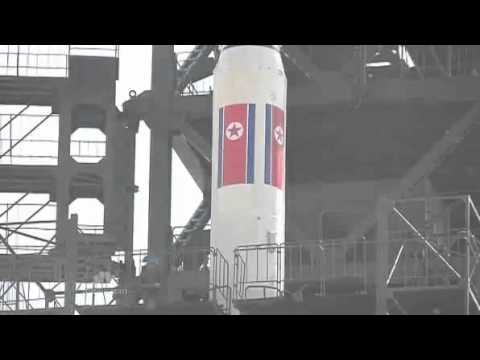
The North Korean rocket launch has failed on Friday morning
Its intended flight path would have taken it south, to the west of the Korean peninsula between Japan and the Philippines.
Both Japan and South Korea had threatened to shoot it down if it threatened their territory.
But officials from several nations observing the launch said the rocket had failed.
“Initial indications are that the first stage of the missile fell into the sea 165 km [105 miles] west of Seoul, South Korea,” the North American Aerospace Defense Command [NORAD] said in a statement.
“The remaining stages were assessed to have failed and no debris fell on land. At no time were the missile or the resultant debris a threat.”
Japan reported similar details.
“At approximately 07:40 we confirmed that a certain flying object was launched from North Korea and fell after flying for just over a minute,” Japanese Defense Minister Naoki Tanaka said.
South Korea said the rocket exploded into some 20 pieces and fell into the sea.
“We are conducting a search operation to retrieve the fallen objects,” a defense ministry official said.
Some five hours after the launch, North Korea confirmed it had been unsuccessful.
“The Earth observation satellite failed to enter its preset orbit. Scientists, technicians and experts are now looking into the cause of the failure,” state-run KCNA news agency said. State television carried a similar announcement.
The US said that North Korea’s behavior was of concern to the global community.
“Despite the failure of its attempted missile launch, North Korea’s provocative action threatens regional security, violates international law and contravenes its own recent commitments,” a White House statement said.
Pyongyang agreed in February to a partial freeze in nuclear activities and a missile test moratorium in return for US food aid. But that deal was put on hold last month after the North announced its rocket launch plans.
Earlier this week reports also emerged from South Korea of a possible third nuclear test being planned by North Korea.
North Korea conducted a similar rocket launch in 2009. On that occasion US and South Korea analysts said the rocket failed to reach orbit – but North Korea said it was a success.
The failure of this launch could pose a challenge for Pyongyang, which is holding a week of high-profile events ahead of the formal celebrations to mark Kim Il-Sung’s birthday on Sunday.
The Workers’ Party held a rare conference on Wednesday and the country’s rubber-stamp parliament is due to meet on Friday.
Both meetings are seen as formalizing the transition of power to young leader Kim Jong-Un following the death of his father Kim Jong-Il in December 2011.
[youtube RfuHtZZF2NY]
Kim Jong-Un, the young North Korean leader, has been given two posts previous occupied by his late father, KimJong-Il.
Kim Jong-Un had been named chairman of the party’s Central Military Commission and a standing member of the Politburo, according to the state media.
The announcement came after North Korea held a rare party conference widely expected to see more power formally transferred to Kim Jong-Un.
The country is due to launch a rocket, set to go between Thursday and Monday.
North Korea says the rocket will put a satellite into orbit but the US says the launch is a disguised test of long-range missile technology.
The launch path will take the rocket south between the Philippines and Japan. Both South Korea and Japan have said that they will shoot it down if it threatens their territory.

Kim Jong-Un had been named chairman of the party's Central Military Commission and a standing member of the Politburo
The news of Kim Jong-Un’s new titles came after the ruling Korean Workers’ Party held a conference on Wednesday.
North Korea’s rubber-stamp parliament is also meeting on Friday and the two meetings have been seen as forums for advancing the transition of power to Kim Jong-Un following the death of his father in December 2011.
Then on Sunday North Korea will mark the 100th anniversary of the birthday of national founder Kim Il-Sung – the grandfather of Kim Jong-Un – with mass celebrations.
North Korea says that the rocket launch is to commemorate Kim Il-Sung. It says that the satellite will send back weather and other data.
But critics say that the launch constitutes a test of long-range missile technology banned under UN resolutions.
The rocket is due to launch any day between 12 and 16 April from the Tongchang-Ri site on the country’s north-west coast.
A number of airlines have altered flight paths and the US has sent a ship-mounted radar to monitor the launch.
Japan said it was on alert ahead of the launch. “We want to be fully prepared for any possible contingency,” Japanese Prime Minister Yoshihiko Noda said.
Pyongyang agreed in February to a partial freeze in nuclear activities and a missile test moratorium in return for US food aid. But that deal was put on hold last month after the North announced its rocket launch plans.
A Pyongyang official has announced that North Korea is poised to complete preparations for its rocket launch scheduled for later this week.
A satellite will be installed on the Unha-3 rocket by the end of Tuesday, the official told foreign journalists in a rare press conference.
The official dismissed concerns that the launch was a cover for developing missile technology as “nonsense”.
Three Asian airlines have made changes to flight paths to avoid the rocket.
“We are expecting to complete assembly by today,” said Ryu Kum-Chol, deputy director of the space development department at the Committee of Space Technology.
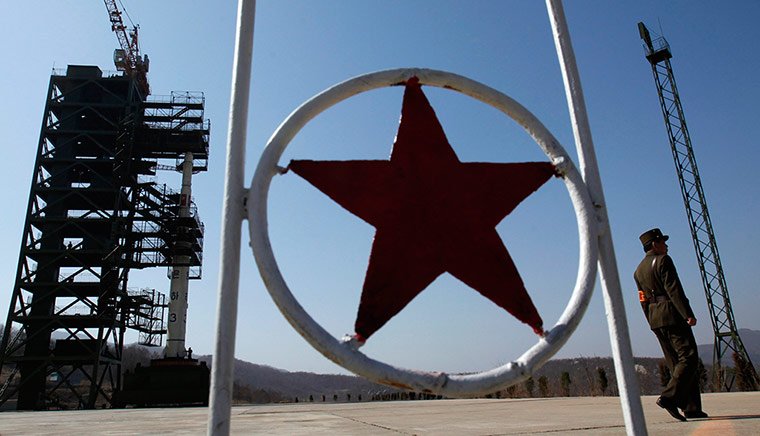
North Korea is poised to complete preparations for its rocket launch scheduled for later this week
Ryu Kum-Chol said the launch was part of the peaceful development of North Korea’s space programme.
North Korea also says it will mark the 100th anniversary of the birth of its late leader Kim Il-Sung.
But opponents of the move fear it is a disguised test of long-range missile technology.
The Philippine Airlines, Japan Airlines (JAL) and All Nippon Airways (ANA) have announced changes to the flight paths several affected routes ahead of the launch period between 12-16 April.
North Korea has made the arrangements to put into position a long-range rocket for a controversial launch next week – amid reports it is also planning a nuclear test.
Pyongyang says the Unha-3 rocket, which it plans to launch between 12 and 16 April, will put a satellite into orbit.
But opponents of the move fear it is a disguised long-range missile test.
Meanwhile, South Korean officials say new satellite images suggest the North is preparing to carry out a third nuclear test.
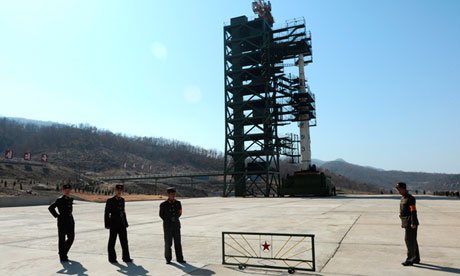
North Korea has made the arrangements to put into position a long-range rocket for a controversial launch next week
The images show piles of earth and sand at the entrance of a tunnel at the Punggye-Ri site, where tests of a nuclear bomb were previously carried out in 2006 and 2009, South Korea’s Yonhap news agency reports.
“Recent satellite images led us to conclude the North has been secretly digging a new underground tunnel in the nuclear test site… besides two others where the previous tests were conducted,” one unnamed official told the AFP news agency.
North Korea has been under close scrutiny by its neighbors and the international community since Kim Jong-Un became leader of the secretive state following the death of his father, Kim Jong-Il, in December 2011.
Pyongyang had agreed in February to a partial freeze in nuclear activities and a missile test moratorium in return for US food aid. But the deal was put on hold last month after the North announced its rocket launch plans.
Foreign journalists were taken by train to the Sohae satellite station at Tongchang-Ri, on the country’s north-west coast, to see for themselves the final preparations for the rocket launch.
All three stages of the rocket were visibly in position at the launch pad, an Associated Press reporter said from the scene.
Station manager Jang Myong-Jim told reporters that preparations were on track and fueling would begin soon, without giving exact timings.
Jang Myong-Jim said the 100 kg (220 pound) satellite is designed to send back images and information that will be used for weather forecasts as well as surveys of North Korea’s natural resources, the AP reports.
Pyongyang has previously said the launch, for “peaceful purposes”, is to mark the centennial of the birth of founding leader Kim Il-Sung.
But the United States and North Korea’s neighbors say it contravenes UN resolutions that were imposed after a similar launch in April 2009.
Japan and South Korea have warned they will shoot the rocket down if it strays into their territory.
Japan announces that will shoot down a North Korean rocket if necessary, as new satellite images appeared to show preparations for the April launch.
Japanese Defense Minister Naoki Tanaka issued the order to intercept the rocket if it threatened Japan’s territory.
Pyongyang says it will launch a satellite on a rocket between 12 and 16 April.
Satellite images taken on Wednesday indicate that work at the launch site is under way, says a US university.
Naoki Tanaka had issued an earlier order on Tuesday to the country’s defense forces to prepare ”destruction measures against ballistic missiles”.
On Friday, he told reporters in Tokyo that he had received cabinet approval to shoot down the rocket if necessary.
Japan began preparing missile defense systems last week.
Pyongyang said it plans to fire a rocket to put a satellite into orbit next month to mark the centennial of the birth of founding leader Kim Il-Sung.
The move has sparked international criticism. North Korea claims the launch is for scientific research and ”peaceful purposes”.
But the United States and North Korea’s neighbors insist it will be a disguised long-range missile test, contravening UN resolutions.
The resolutions were imposed after a similar launch in April 2009. Japan is particularly concerned as the last North Korean rocket was launched over the north of the country.
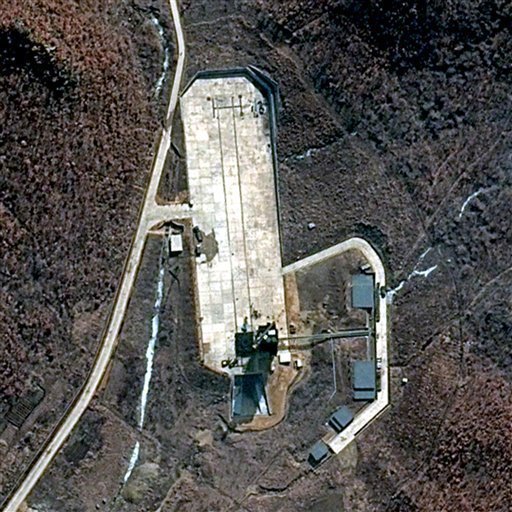
Japan announces that will shoot down a North Korean rocket if necessary, as new satellite images appeared to show preparations for the April launch
It is thought that the North Korean rocket will follow a new southern trajectory instead of a route to the east over Japan. It will now pass close to south-western Japan instead.
South Korea also warned earlier this week that it might shoot down any North Korean rocket that strayed into its territory.
US Assistant Secretary of State Kurt Campbell over the weekend said that the rocket may affect an area between Australia, Indonesia and the Philippines.
President Benigno Aquino III has expressed concern that rocket debris may fall on Philippine territory, and called on Pyongyang to abandon the launch.
US media reports say that the US is sending its sea-based X-band radar – a radar system that sits atop a floating platform – out into the Pacific to monitor the launch. Officials have confirmed the craft left Hawaii on 23 March.
The controversial launch also comes only weeks after North Korea agreed to return to talks on its nuclear programme in return for food aid from the US – a deal which is now on hold.
At the Nuclear Security Summit in Seoul earlier this week, President Barack Obama warned Pyongyang that its planned launch would only increase its isolation and lead to further sanctions.
The new satellite images, taken by a private US firm, DigitalGlobe, show that preparations are proceeding at the Tongchang-dong launch site in North Korea.
An analysis published on the 38 North website by the US-Korea Institute at the Paul H. Nitze School of Advanced International Studies (SAIS) said that ”activity has been ongoing” at the site since last week.
”Unless some major setback occurs, the North Koreans will be able to launch during the declared launch window starting 12 April 2012,” said the article by the institute at the Johns Hopkins University.
Meanwhile, South Korean media is reporting that the North fired two short-range missiles, believed to be surface-to-ship missiles, on Thursday.
The test firing of the KN-01 missiles took place off the west coast in North Pyongan Province, the newspapers reported on Friday, citing military sources in South Korea.
The incident did not appear to be related to the upcoming rocket launch, the sources said.
Military officers believed that the move was a warning by Pyongyang to South Korean and US military, the Chosun Ilbo newspaper reported.
The United States has confirmed the decision to put on hold planned food aid to North Korea.
The decision comes after Pyongyang announced a new rocket launch, which the US says breaks the terms of a deal agreed last month.
Earlier reports that the food aid plans had been suspended were confirmed by a Pentagon official on Wednesday.
Peter Lavoy told lawmakers North Korea had violated a missile test moratorium agreement and could not be trusted to deliver the aid properly.
Under the deal signed in February, North Korea agreed to a partial freeze in nuclear activities and a missile test moratorium in return for US food aid.
Peter Lavoy, acting assistant secretary of defense for Asian and Pacific affairs, told a government committee that next month’s planned rocket launch “reflects [North Korea’s] lack of desire to follow through on their international commitments and so we’ve been forced to suspend our activities to provide nutritional assistance”.

The United States has confirmed the decision to put on hold planned food aid to North Korea
North Korea claims the launch – which is scheduled for between April 12-16 – is only a satellite and is for scientific purposes.
But the US and North Korea’s neighbors insist it will be a long-range missile test, breaking the terms of last month’s agreement.
The US has not delivered food aid to North Korea since 2009, but sent officials to Pyongyang’s ally China earlier this month to finalize plans to re-start food deliveries.
North Korea has suffered persistent food shortages since a famine in the 1990s, and relies on foreign aid to feed its people.
The planned 240,000 tons of food aid from the US was to go to children and pregnant women.
Almost 60 leaders from around the world attending 2012 Seoul Nuclear Security Summit have called for closer co-operation to tackle the threat of nuclear terrorism.
South Korean President Lee Myung-Bak said nuclear terrorism remained a “grave threat”, while US President Barack Obama said action was key.
Chinese President Hu Jintao urged the group to work together on the issue.
The meeting has so far been dominated by North Korea’s plan to launch a rocket next month.
North Korea says the long-range rocket will carry a satellite. The US says any launch would violate UN resolutions and constitute a missile test.
Iran’s nuclear programme was also on the minds of the summit participants, with Barack Obama pledging to meet the leaders of Russia and China on the sidelines to work towards a resolution.

Almost 60 leaders from around the world attending 2012 Seoul Nuclear Security Summit have called for closer co-operation to tackle the threat of nuclear terrorism
At the summit, world leaders are discussing measures to fight the threat of nuclear terrorism, including the protection of nuclear materials and facilities, as well as the prevention of trafficking of nuclear materials.
There are currently no binding international agreements on how to protect nuclear material stored peacefully inside its home country. An amendment seeking to do that is still unratified after seven years.
Addressing the summit, Barack Obama warned there were still “too many bad actors” who were threatening to stockpile and use ”dangerous” nuclear material.
“It would not take much, just a handful or so of these materials, to kill hundreds of thousands of innocent people and that’s not an exaggeration, that’s the reality that we face,” Barack Obama said.
“The security of the world depends on the actions that we take.”
Hu Jintao called for “an international environment conducive to boosting nuclear security” to be created and Lee Myung-Bak called for concrete action to tackle a threat that posed “a grave challenge” to peace.
The summit, attending by almost 60 leaders from around the world, is due to issue a communiqué later in the day.
Meetings on Monday were overshadowed by North Korea’s planned launch, scheduled to take place between 12 and 16 April.
Pyongyang says it is intended to mark the 100th anniversary of the birth of North Korea’s founding leader Kim Il-Sung.
On Tuesday, a North Korean foreign ministry spokesman said that the launch will go ahead as planned and criticized Barack Obama’s stance as ”confrontational”.
North Korea ”will never give up the launch of a satellite for peaceful purposes”’, the spokesman said in a statement in the official KCNA news agency.
A report by the KCNA also described the ”weather satellite” Pyongyang planned to launch as useful for ”the study of weather forecast needed for agriculture and other economic fields”.
Japanese Prime Minister Yoshihiko Noda, speaking at the summit, called on Pyongyang to cancel the rocket launch, saying that it would violate UN Security Council resolutions.
“As such, the international community strongly urges North Korea to exercise restraint and cancel the launch,” Yoshihiko Noda said.
The resolutions were passed after a similar launch in April 2009. Japan is particularly concerned as that rocket was launched over the country three years ago.
The US and Chinese presidents met on Monday on the sidelines of the summit and agreed to co-ordinate their response to any “potential provocation” if Pyongyang went ahead with the launch.
South Korea and the US say North Korea risks further sanctions and isolation if it does not cancel its plans. Seoul has also warned it will shoot down the rocket if it strays over South Korean territory.
Addressing Iran, Barack Obama said on Monday that there was still time to resolve the impasse over its nuclear programme through diplomacy.
“But time is short,” Barack Obama warned.
”Iran must act with the seriousness and sense of urgency that this moment demands.”
Iran insists there is no military element to its programme but Western powers fear it is constructing nuclear weapons.
Nuclear stockpiles in numbers
• Russia: 10,000
• US: 8,500
• France: 300
• China: 240
• UK: 225
• Pakistan: 90-110
• India: 80-100
• Israel: 80
• North Korea: fewer than 10
Source: Federation of American Scientists
[youtube LSpcMP5Jtn8]
Speaking ahead of Seoul Nuclear Security Summit, which aimed at reducing the risk of nuclear terrorism, US President Barack Obama says he is pushing for “a world without nuclear weapons”, making direct appeals to North Korea and Iran.
Barack Obama also pledged to work with Russia and China.
He emphasized the US’s unique position to seek change but said “serious sustained global effort” was needed.
The meeting is being attended by representatives from some 50 countries.
Speaking to students at Hankuk University, Barack Obama reiterated the commitment of the US as ”the only nation to have ever used nuclear weapons” to reducing its nuclear arms stockpile.
The US president also spoke, he said, as a father who did not want to see his daughters growing up in a world with nuclear threats, a comment which drew applause from his student audience.
Barack Obama said he was looking forward to meeting newly-elected Russian President Vladimir Putin in May to discuss further nuclear arms cuts.
He would seek to follow on from the New START (Strategic Arms Reduction Treaty) pact he struck in 2010 with outgoing Russian leader Dmitry Medvedev in 2010, he said.
The New START deal agreed between Washington and Moscow was intended to replace its lapsed predecessor, START.
It trims US and Russian nuclear arsenals to 1,550 deployed nuclear warheads – a cut of about 30% from a limit set previously.
The treaty would also allow each side visually to inspect the other’s nuclear capability, with the aim of verifying how many warheads each missile carries.
In addition, there will be legally binding limits on the number of warheads and missiles that can be deployed on land, on submarines, and on bombers, at any one time.
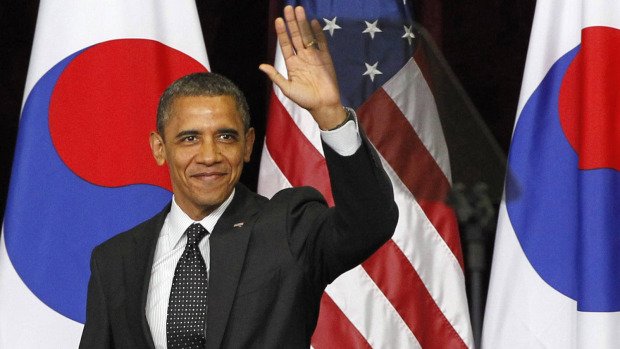
President Barack Obama said he is pushing for "a world without nuclear weapons" ahead of Seoul Nuclear Security Summit
In Asia, Barack Obama said, the US has invited China to work with Washington and ”that offer remains open”.
The US president also addressed North Korea’s nuclear ambitions directly in his speech, saying that the US has ”no hostile intent” towards the country, but ”there will be no rewards for provocation”.
Barack Obama warned Pyongyang that its planned long-range missile launch would only increase its isolation.
Pyongyang says it is preparing to launch a long-range missile which it says will put a satellite in orbit.
”You can continue with the road you are on but we know where that leads,” Barack Obama said, addressing the North Korean leaders directly.
”Today, we say: Pyongyang, have the courage to pursue peace.”
Earlier, Barack Obama and South Korean President Lee Myung-bak said North Korea risked further sanctions and isolation if it did not cancel its launch plans.
The launch will contravene an agreement Pyongyang reached last month which would have seen it receive food aid in exchange for a partial freeze on nuclear activities and an end to ballistics tests.
The North also agreed to allow UN inspectors in, the US said.
The invitation comes three months after Kim Jong-Un came to power following the death of his father, Kim Jong-Il.
The North said the launch – between 12 and 16 April – would mark the 100th birthday of former leader Kim Il-Sung.
South Korea has warned it will shoot down the rocket if it strays over its territory.
“We are preparing measures to track the missile’s trajectory and shoot it down if it, by any chance, deviates from the planned route and falls into our territory,” a defense ministry spokesman said.
The launch site is in north-western North Korea, not far from the Chinese border.
Addressing Iran, Barack Obama said there was still time to resolve the impasse over its nuclear programme through diplomacy.
“But time is short,” Barack Obama warned.
”Iran must act with the seriousness and sense of urgency that this moment demands.”
Iran insists there is no military element to its programme but Western powers fear it is constructing nuclear weapons.
“Today, I’ll meet with the leaders of Russia and China as we work to achieve a resolution in which Iran fulfils its obligations,” Barack Obama added.
Despite lofty announcements it may prove difficult to achieve significant progress at the summit.
The summit agenda is to be expanded to include a wide variety of radiological materials which terrorists could use to make a dirty bomb – one that spreads radiological contamination rather than initiating a nuclear explosion
But experts say there is unlikely to be agreement on converting all nuclear power stations to use low-enriched fuel.
Nor will there be agreement on common standards for nuclear security.
Some countries see this whole process as highly intrusive.
And there is still no common appreciation of the level of threat posed by nuclear terrorism.
[youtube qyCmPWrWRiU]
President Barack Obama has visited the Demilitarized Zone (DMZ) separating South Korea from North Korea, amid rising tensions over the North’s planned rocket launch.
Barack Obama went to an observation post on the volatile border, and met US troops. The president will hold talks in Seoul later.
The US has voiced concern that the North Korea’s rocket launch due in April is a pretext for a missile test. Pyongyang says it wants to put a satellite into orbit.
On Monday, Barack Obama will attend a security summit in Seoul.
The conference in the South Korean capital will be attended by leaders from more than 50 nations.
The summit main focus will be preventing criminal or militant groups from acquiring nuclear weapons.
Pyongyang’s nuclear programme is not officially on the agenda. But American officials have made it clear that President Barack Obama will be discussing the programmes of both North Korea and Iran in bilateral meetings with the Chinese and Russian presidents, our correspondent says.
North Korea is not taking part in the summit.

President Barack Obama has visited the Demilitarized Zone (DMZ) separating South Korea from North Korea, amid rising tensions over the North's planned rocket launch
It was Barack Obama’s first visit to the DMZ, which has bisected the peninsula since the end of the Korean War in 1953.
The president told US troops serving there that they were protecting “freedom’s frontier”.
Earlier this week, Japan said it was readying its anti-missile defenses ahead of North Korea’s launch, expected between 12 and 16 April.
Pyongyang says the rocket – which would mark the 100th birthday of its late Great Leader Kim Il-Sung – would take a new southern trajectory instead of a previous route east over Japan.
US Assistant Secretary of State Kurt Campbell has said an area between Australia, Indonesia and the Philippines could be affected by the flight path.
North Korea has shown a growing mastery of ballistic technology during its three previous long-range tests.
However, experts say none has succeeded in reaching orbit, and debris has fallen to earth at various stages during the launches.
Last month North Korea offered a deal involving the freezing of its nuclear and long-rang missile programmes in return for US food aid.
North Korean rocket due to be launched in April may affect an area between Australia, Indonesia and the Philippines, says US Assistant Secretary of State Kurt Campbell.
Kurt Campbell is reported to have asked the three countries to condemn the launch.
North Korea says the rocket will take a new southern trajectory instead of a previous route east over Japan.
Japan is readying anti-missile defenses around the southern islands of Okinawa, which could be under the flight path.
North Korea says the rocket is intended to put a satellite in space, but the US and others say the launch is a cover for a long-range missile test – a potential delivery system for nuclear weapons.
The launch is expected to dominate a security summit on Monday in the South Korean capital Seoul, which will be attended by US President Barack Obama.
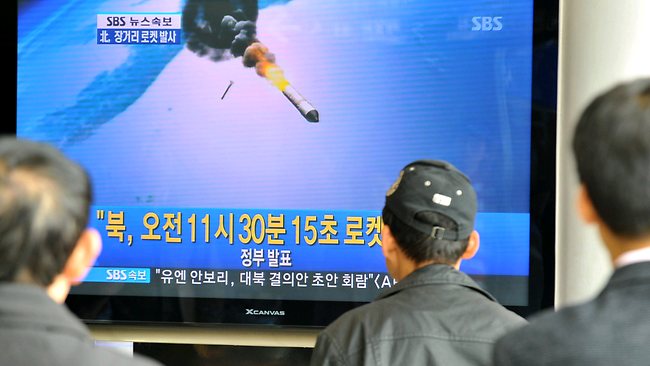
North Korean rocket due to be launched in April may affect an area between Australia, Indonesia and the Philippines
Australia’s Sydney Morning Herald said Kurt Campbell had briefed Australian Foreign Minister Bob Carr on Friday on the rocket’s southward trajectory.
“If the missile test proceeds as North Korea has indicated, our judgment is that it will impact in an area roughly between Australia, Indonesia and the Philippines,” the paper quoted Kurt Campbell as saying.
“We have never seen this trajectory before. We have weighed into each of these countries and asked them to make clear that such a test is provocative and this plan should be discontinued.”
Pyongyang appears to be trying to soften the political impact of its planned rocket launch.
It has chosen a new southerly route mainly over open sea, avoiding what is regarded as a more provocative easterly trajectory over the main Japanese island.
North Korean state-run KCNA news agency said: “A safe flight orbit has been chosen so that carrier rocket debris to be generated during the flight would not have any impact on neighboring countries.”
North Korea has shown a growing mastery of ballistic technology during its three previous long range tests.
However, experts say that none has succeeded in reaching orbit, and debris has fallen to earth at various stages during the launches.
Pyongyang said last week that the rocket launch – between 12 and 16 April – would mark the 100th birthday of its late Great Leader Kim Il-Sung.
Japan prepares its anti-missile defense systems in response to the planned launch of a North Korean long-range rocket next month, Defense Minister Naoki Tanaka has said.
Reports said the defense systems would be deployed near the island of Okinawa to shoot down the rocket should it threaten Japanese territory.
North Korea says the rocket will put a satellite into orbit.
But the US and its allies believe the launch is a pretext for a missile test.
Pyongyang said last week it was to mark the 100th birthday of its late Great Leader Kim Il-sung with the launch.
The announcement drew widespread criticism that the launch would violate UN Security Council resolutions.
The resolutions were imposed after a similar launch in April 2009. Japan is particularly concerned as the last North Korean rocket was launched over the country.
“I have ordered officials to prepare to deploy the PAC-3 and Aegis warships,” Naoki Tanaka said.
The Japanese parliament also passed a resolution condemning the launch.
South Korea, China and the US have also expressed concern over the planned North Korean launch.
“It would be a grave provocation threatening the peace and security of the Korean peninsula and north-east Asia,” the South Korean foreign ministry said in a statement.
Nuclear envoys from South Korea and Japan held talks in Seoul to work out how they would respond if the launch were to go ahead, South Korea’s Yonhap news agency reported.
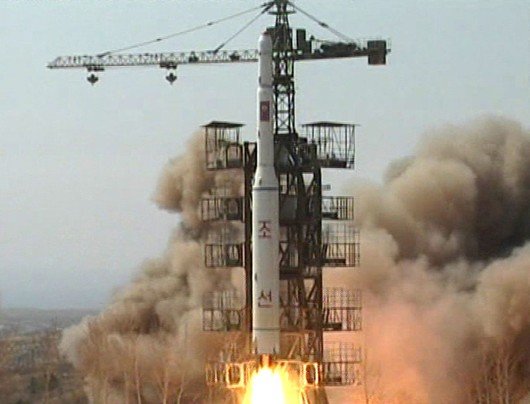
Japan prepares its anti-missile defense systems in response to the planned launch of a North Korean long-range rocket next month
Meanwhile, Chinese state-run news agency Xinhua said Deputy Foreign Minister Zhang Zhijun met Pyongyang’s ambassador to express Beijing’s “worry”.
US Secretary of State Hillary Clinton called North Korea’s announcement “highly provocative”.
UN Secretary General Ban Ki-moon said any launch could discourage aid donors.
“Such an act would undermine recent positive diplomatic progress and, in its effect on international donors, would likely worsen the humanitarian situation inside the country,” he said in a speech in Singapore.
Last month, Pyongyang agreed to suspend long-range missile tests as part of a deal for the United States to supply 240,000 tons of food aid to North Korea.
It also agreed to suspend uranium enrichment and to allow back UN weapons inspectors as part of the deal.
A US state department spokesperson said it would be “hard to imagine” giving food aid to North Korea, as previously agreed, if Pyongyang went ahead with the rocket launch.
In the launch three years ago, Pyongyang said the satellite made it into orbit and characterized it as a test of its satellite technology.
The move drew condemnation from the US and South Korea and led to the UN resolutions prohibiting the North from nuclear and ballistic missile activity.
Foreign officials said there were no indications that a satellite had reached space and that the launch was a cover for Pyongyang to test long-range missile technology.
North Korea said last week that the launch of a rocket carrying a satellite would take place between 12 and 16 April.
The ”working satellite”, the Kwangmyongsong-3, is an opportunity for ”putting the country’s technology of space use for peaceful purposes on a higher stage”, said a North Korean spokesman.
The rocket would be launched from the Solace Satellite Launching Station in Cholsan county, North Pyongyang province on the country’s west coast.
State media also reported that North Korea has already launched two experimental satellites.
UN nuclear inspectors have been invited to North Korea for the first time in three years, the country’s chief nuclear negotiator Ri Yong-Ho has confirmed.
Ri Yong-Ho said the aim of the move was to implement a deal with the US.
North Korea last month agreed to suspend nuclear and long-range missile tests in return for food aid. It also agreed to allow UN inspectors in, the US said.
The invitation comes three months after Kim Jong-Un came to power following the death of his father, Kim Jong-Il.
But North Korea’s pledge to co-operate with the international community was thrown into doubt last week, when Pyongyang announced plans to launch what it called a rocket-mounted satellite.
North Korea said the launch – between 12 and 16 April – would mark the 100th birthday of its late Great Leader Kim Il-sung.
Any launch would be seen as violating UN Security Council resolutions, and the US has described the plans as “highly provocative”.

North Korea sent an invitation letter to UN nuclear watchdog three months after Kim Jong-Un came to power following the death of his father, Kim Jong-Il
The Vienna-based International Atomic Energy Agency (IAEA) – the UN’s nuclear watchdog – announced it had received the invitation from North Korea on Monday.
It said it would discuss the possible visit with Pyongyang and “other parties concerned”.
“Nothing has been decided yet,” IAEA spokeswoman Gill Tudor was quoted as saying by Reuters news agency.
The move was confirmed later by Ri Yong-Ho. Speaking in Beijing, he said: “In order to implement the agreement, we’ve sent a letter of invitation to the IAEA to send inspectors to our country.”
It is unclear how much scope for inspections the IAEA would be given.
In the past North Korea has limited access to key sites.
Pyongyang expelled IAEA inspectors 10 years ago after a deal with the US unravelled.
In 2003, the secretive Communist state withdrew from the Nuclear Non-Proliferation Treaty.
The inspectors were allowed back several years later – but were thrown out again in 2009.
North Korea has announced the launch of a satellite mounted on a rocket to mark the 100th birthday of its late former President Kim Il-Sung.
The rocket launch will take place between 12 and 16 April, a spokesman for the Korean Committee for Space Technology said.
South Korea said the launch would be a “grave provocation” and Japan urged the North to “exercise restraint”.
The move is seen as violating UN Security Council resolutions passed after a similar launch in 2009.
Japan is particularly concerned as North Korea’s April 2009 rocket was launched over the country.
Japan’s chief cabinet secretary, Osamu Fujimura, told a news conference on Friday that his country had set up a crisis management taskforce to monitor the situation and was co-operating with the US and South Korea.
“We believe a launch would be a move to interfere with our effort toward a dialogue, and we strongly urge North Korea not to carry out a satellite launch,” Osamu Fujimura said.
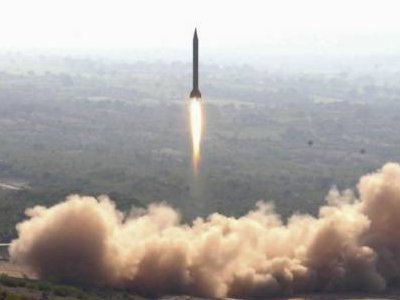
North Korea plans of launching a rocket in April is seen as violating UN Security Council resolutions passed after a similar launch in 2009
South Korea’s foreign ministry said such a move would be a “clear violation” of UN Security Council Resolutions.
“It would be a grave provocation threatening the peace and security of the Korean peninsula and north-east Asia,” the ministry said in a statement.
Last month, Pyongyang agreed to suspend long-range missile tests.
The agreement was part of a deal for the United States to supply 240,000 tons of food aid to North Korea.
In the 2009 launch, Pyongyang said the satellite made it into orbit and characterized it as a test of its satellite technology.
The move drew condemnation from the US and South Korea and led to the UN resolutions prohibiting the North from nuclear and ballistic missile activity.
Foreign officials said there were no indications that a satellite had reached space and that the launch was a cover for Pyongyang to test long-range missile technology.
The launch next month of a ”working satellite”, the Kwangmyongsong-3, is an opportunity for ”putting the country’s technology of space use for peaceful purposes on a higher stage”, said a North Korean spokesman.
The rocket would be launched from the Solace Satellite Launching Station in Cholsan county, North Pyongan province on the country’s west coast.
State media also reported that the North has already launched two experimental satellites.
Following talks with the US, North Korea has agreed to suspend uranium enrichment, as well as nuclear and long-range missile tests.
The US State Department said Pyongyang had also agreed to allow UN inspectors to monitor its reactor in Yongbyon to verify compliance with the measures.
In return, the US is finalizing 240,000 tons of food aid for the North.
The move comes two months after Kim Jong-Un came to power following the death of his father, Kim Jong-Il.
The move could pave the way for the resumption of six-party disarmament negotiations with Pyongyang, which last broke down in 2009.
US Secretary of State Hillary Clinton said the US still had “profound concerns” over North Korea, but welcomed the move as a “first step”.
“On the occasion of Kim Jong-Il’s death, I said that it is our hope that the new leadership will choose to guide their nation onto the path of peace by living up to its obligations.
“Today’s announcement represents a modest first step in the right direction.”
Hillary Clinton said the US would however be watching Pyongyang closely, and would be “judging North Korea’s new leaders by their actions”.
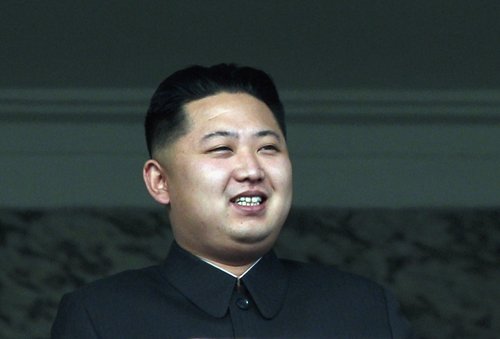
North Korea agreed to nuclear moratorium two months after Kim Jong-Un came to power following the death of his father, Kim Jong-Il
North Korea confirmed the move in a foreign ministry statement released in Pyongyang.
The statement, carried by the KCNA news agency, said the measures were “aimed at building confidence for the improvement of relations” between the two countries, and said talks would continue.
Yukiya Amano, director general of the UN International Atomic Energy Agency (IAEA), said the announcement was “an important step forward” and that inspectors stood ready to return to North Korea, Reuters reports.
Earlier, a senior US military official said the issue of food aid for North Korea was now linked to political progress – contradicting earlier policy.
North Korean population has suffered persistent food shortages since a famine in the 1990’s, and relies on foreign aid to feed its people.
The country agreed in 2005 to give up its nuclear ambitions in return for aid and political concessions, as part of a six-nation dialogue process involving the two Koreas, the US, China, Russia and Japan.
But progress on the deal was stop-start, and the agreement broke down in 2009.
Contact between the US and North Korea aimed at restarting the talks began in July 2011.
A meeting last week between US and North Korean officials in Beijing was the third round of talks aimed at exploring how to bring North Korea back to the negotiating table.
 Prev1...192021Next
Prev1...192021Next  Page 20 of 21
Page 20 of 21


























